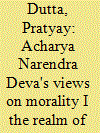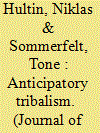|
|
|
Sort Order |
|
|
|
Items / Page
|
|
|
|
|
|
|
| Srl | Item |
| 1 |
ID:
130826


|
|
|
|
|
| Publication |
2014.
|
| Summary/Abstract |
Acharya Narendra Deva strongly believed that the Gandhian ideas based on morality and ethics could be the only solution to meet the basic needs of a society both developing and developed. It was thus that even after independence, he wielded the Gandhian weapon of Satyagraha most effectively to ?ght every form of injustice against the oppressed and the depressed in the then Indian society. Like Gandhi, he gave the highest priority for the removal of rural backwardness and he was in favour an innovative technology that could help in bringing an all round development in a developing society. He was a profound thinker who could analysis political, economic and social problems in their totality and his socio~political ideas about the solution to the problems facing the nation and society was exclusively original in its entirety. Narendra Deva accepted the value of morality and ethics of Gandhi and practised it fully throughout his whole life. It was Gandhi, who ?rst demonstrated the powerful effect on his countrymen of renouncing wealth for the sake of human service rather than personal salvation and Deva had trodden the same pathway into lndia's heart. Gandhi and Narendra Deva acquired their moral strength through renunciation, much as lndia's ancient sageswere supposed to obtain magical powers through their austerities. Their magic was singleness of purpose and an iron will. When Deva joined the Indian political
struggle under Gandhian leadership, the Mahatma once told him to simplify life and he took his words to heart. They never urged anyone else to follow their way of life and went their own way with a striking serenity. As a leading intellectual of outstanding mould, Acharya Narendra Deva had a forceful urge to bring about social justice, processed through a strong vein of idealism and always expressed deep concern for the down- trodden lndian masses. He remained a path?nder of the socialist movement in India and strongly believed that freedom was the first postulate for the establishment of the socialist society in India. He felt that without political independence the socialist programme could never become a reality. Narendra Deva always emphasized the moral and cultural elements of Marxism, but in the Indian socio-political context, he said that the class con?ict was already in existence and the real question was on whose side you were going to stand. Moreover, it was wrong to assume that the capitalist class had no vested interest in the freedom struggle. He, therefore, viewed that the socialists should create consciousness among labour, convince them that their interest would be well protected inn the freedom struggle and should broaden the base of that struggle by organizing the toilers. That is why; Gandhi and Deva wanted the historical stream of the cultural progress of India, in order to sustain the flow of continuity. In fact, Gandhi and Narendra Deva's entire socio-political ideas were ofa new social order purely based on universal love, ahimsa, morality and most importantly the role of ethics in Indian politics. Gandhi's ideal society was a non-violent and stateless society and repudiated state on ethical, historical and economic grounds. Unlike Marx, Gandhi and Deva persistently put emphasis on moral force and on the - realization of one's own self and there was no place for violence in their whole socio-political philosophy. The purpose ofthe article is to highlight the impact of ethics and morality on Narendra Deva's socio-political ideas and its relevance in the 21" century.
|
|
|
|
|
|
|
|
|
|
|
|
|
|
|
|
| 2 |
ID:
173866


|
|
|
|
|
| Summary/Abstract |
This article examines the upsurge in denunciations of ‘tribalism’ in public debate during The Gambia's transition from the autocracy of Yahya Jammeh to the ‘New Gambia’ under President Adama Barrow. In these public debates, derogatory statements about particular ethnicities articulate fears of present or future alliances to monopolise political power. These fears are disproportionate to attempts of organised political mobilisation on ethnic grounds, which remain marginal. It is argued that accusatory politics are a salient, and neglected, feature of ethnic dynamics in contemporary Gambian – and African – politics. This politics of accusation involves the contestation and negotiation of moral legitimacy in the political sphere, in a manner challenging the separation of the moral and the political undergirding scholarly distinctions between ethnicity and tribalism.
|
|
|
|
|
|
|
|
|
|
|
|
|
|
|
|
| 3 |
ID:
133560


|
|
|
|
|
| Publication |
2014.
|
| Summary/Abstract |
This is a review article of two books that respond to convergences and turning points in how societies undergoing peacebuilding processes respond and engage with such processes. The two books demonstrate that these interventions are not an overpowering and coherent strategy, and even less so a practice. They suffer constraints and blowbacks in such a way that their moral, political and even military power is not as hegemonic or universally applicable as it was once portrayed in the literature. The different use of 'challenges' and 'resistance' to conceptualise these constraints and blowbacks points to the need for further research on how different actors interact beyond their role as interveners, peacekeepers or local actors.
|
|
|
|
|
|
|
|
|
|
|
|
|
|
|
|
|
|
|
|
|